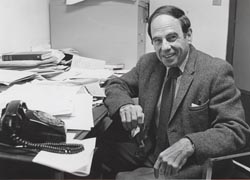Temple Professor Peter Bachrach, political scientist and leading theorist of participatory democracy, dies at 89
Peter Bachrach, prominent political theorist and professor emeritus of political science at Temple, died on Dec. 14 at his home in Southwest Harbor, Maine. He was 89. Professor and Chair of Political Science Gary Mucciaroni said, “The work of Peter Bachrach continues to have a significant impact on political theory and political science. He ranks as one of the most famous scholars ever to have taught in our department.” Bachrach, who retired from Temple in 1988, advocated a dialectical approach to democracy, recognizing the need to both legitimate the majority and protect the minority. |
 Courtesy Temple University Libraries/Templana Collection
Peter Bachrach
|
|
Today, Bachrach’s landmark 1962 article “Two Faces of Power,” which appeared in American Political Science Review, is the most widely cited article in the discipline of political science. In this influential piece, Bachrach pointed out that a lack of controversy in social life may, in fact, reflect latent power conflicts. According to Bachrach, prevailing institutions and political procedures can limit the decision-making abilities and the formation and articulation of concerns among disenfranchised groups. “Throughout his career, Peter single-mindedly pursued strategies to promote one central idea — participatory democracy,” said Aryeh Botwinick, a Temple colleague who coauthored Power and Empowerment: A Radical Theory of Participatory Democracy with Bachrach in 1992. Botwinick described Bachrach’s collaborative style this way: “All of his books — of which there were more than 10 — were co-authored. And, while each author contributed a great deal, Peter really was the main engine. They were Peter’s ideas, but he always worked with another author to further expand his theories.” The value that Bachrach placed on participation could also be witnessed in the classroom. Said Botwinick, “He was an immensely popular teacher, in part because he even taught in a participatory way in which all students could voice their thoughts very freely and openly.” A native of Winnetka, Ill., Bachrach earned a bachelor’s degree from Reed College in Portland, Ore., and earned a doctorate in political science from Harvard University. He served on the faculty of Bryn Mawr College for more than 22 years before joining the Temple faculty in 1968. In 1971, Bachrach enacted his commitment to democratic participation when he joined with Temple’s student senate and threatened court action to demand that the administration open its financial records to justify raising tuition. He argued that Temple was a public space and that therefore the university’s budget and trustees’ minutes should be open for public scrutiny. Bachrach and his first wife, Florence Rice Bachrach, raised six children in Ardmore. She died in 1975. Since 1976, he had been married to Adrienne A. Bachrach, with whom he lived in Center City before moving to Maine in 1992. In addition to his wife, Bachrach is survived by daughters Lori, Kate, Sarah, Molly and Ruth; a son, David; stepchildren Alice, Malcolm, Robin and Bill; a sister; and 22 grandchildren. |
|